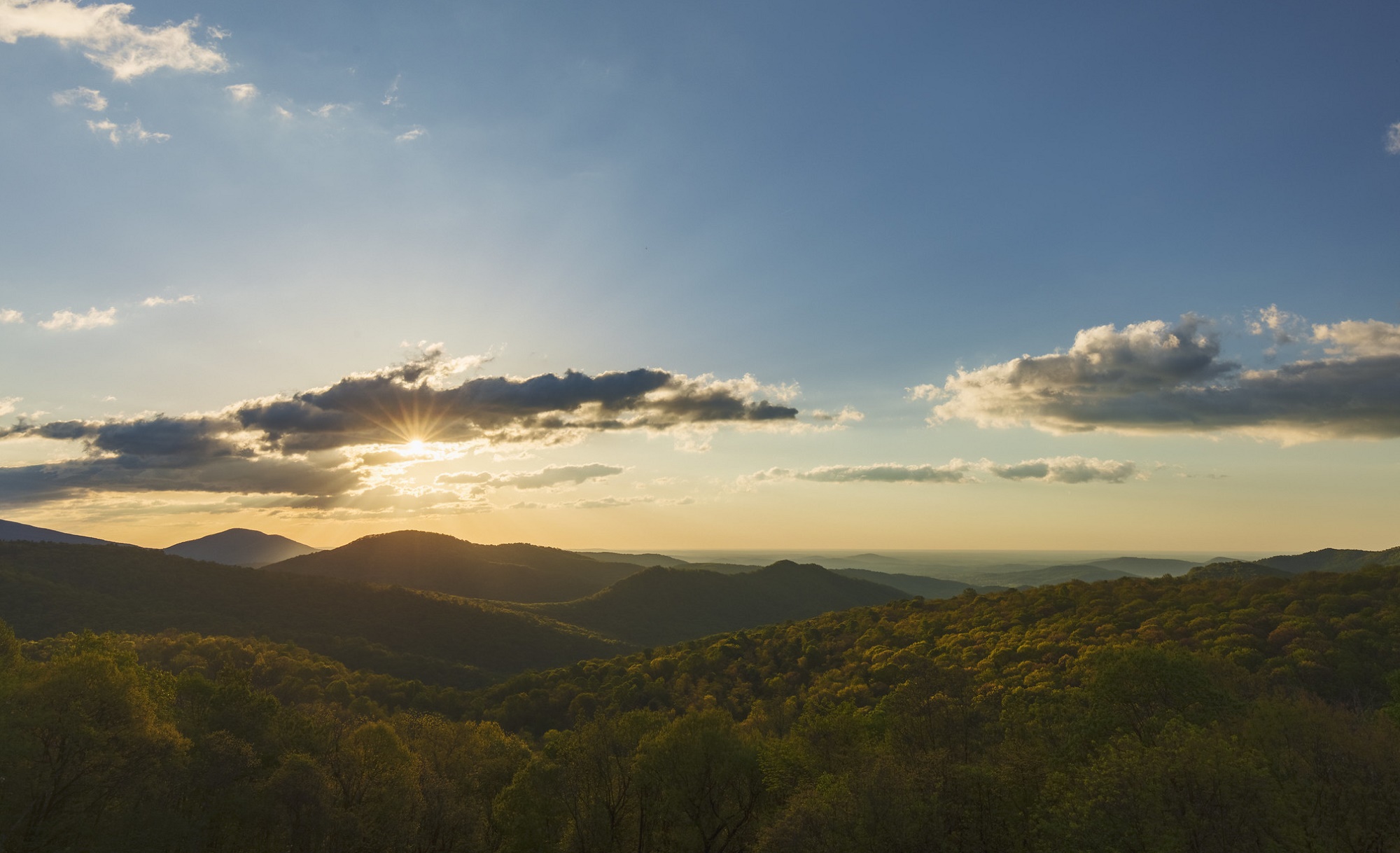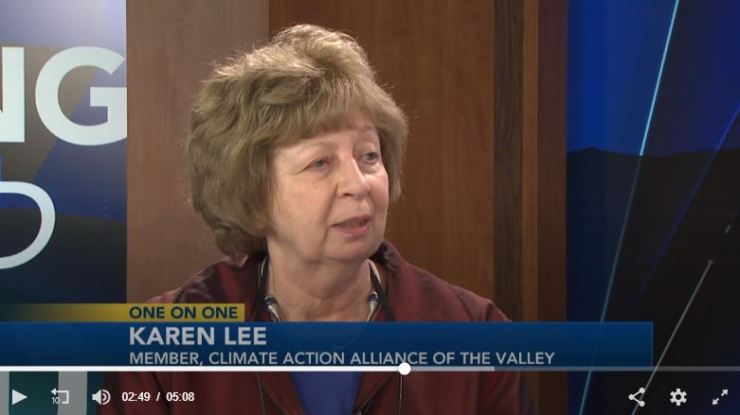
On March 20, 2019, the Climate Action Alliance of the Valley presented “Wake up Virginia!!! Mobilizing for Our Climate Crisis.” We proudly hosted Karen Campblin of Fairfax, Co-Chair of the Green New Deal Virginia Coalition, and Environmental and Climate Justice Chair for the Virginia NAACP; Bob Shippee of Richmond, Legislative and Political Chairs of the Sierra Club Virginia Chapter; and April Moore of Shenandoah County, member of the Chesapeake Climate Action Network Board of Directors, to answer questions on state level legislative ways to address the rapidly evolving issue of fossil fuel-driven environmental degradation. Some 85 community members gathered at the Rockingham County Government Center’s community room to be part of this discussion.

Moderator Karen Lee posed a series of five questions to the panelists, followed by questions from the audience. These questions, and the responses, are summarized below:
About the scope of the climate problem—Are we looking at a crisis where we need to mobilize like we did in WW II? What lessons do you think that experience offers us today?
The three panelists all agreed that the Climate Crisis facing our nation and world is unequivocally worthy of a World War II scale mobilization and investment. They agreed that we are experiencing a true emergency that calls for leadership by government, science, and business to ensure we respond promptly and effectively.
What is the status of the legislation you have been focusing on? What have been the biggest obstacles to getting them passed?
Major legislation during the 2019 General Assembly session included bills focused on the Regional Greenhouse Gas Initiative (RGGI, pronounced like the name “Reggie”), Solar Freedom, Solar Demonstration Project, and Coal Ash Removal. RGGI would have authorized proceeds from carbon auctions to belong to Virginia and Virginia would determine how to use them. Without RGGI, the utilities would receive proceeds and decide on their use. The Solar Freedom legislation would have removed existing barriers to Virginians—individuals and businesses—who want to deploy solar energy. The Solar Demonstration Project would have allowed a pilot project to examine the feasibility of solar in low and moderate income communities. Coal Ash Removal would require appropriate disposal of massive amounts of toxic coal residue from several “ponds.” All but the last piece of legislation was defeated because of legislative partisanship and parochialism and the persuasive power of Virginia’s largest utility.
What strategies are your organization and partners using to move forward the legislation you support in future legislative sessions?
The newly formed Virginia Green New Deal is hosting an April 27 partner summit during which it hopes to form alliances and partnerships with other organizations to develop legislative framework for the 2020 General Assembly session. The panelists suggested not only participating in this activity but also having off-season conversations with legislators and organizations around issues such as clean air, safe water, renewable energy, local-scale agriculture, and job training.
What suggestions do you have about how we can work with other groups to move Virginia toward more renewable energy and toward less fossil fuel dependence? I am thinking of groups like conservatives for clean energy, evangelicals, creation care groups, libertarian groups, and environment social justice groups.
Suggestions included:
- Develop local “people power” such as local solar cooperatives.
- Establish relationships with diverse organizations that share a common interest such as labor groups, coal miners, cleaner transportation advocates, and health workers.
- Do coalition building within a community and among other Virginia communities to focus on the intersection of economic, climate, and social justice priorities and propose ways to move forward within that overlap.
- Don’t build walls. Meet others where they are. Look for commonality.
Even though next year’s General Assembly session convenes in January, we recognize that a lot of legislative work happens much earlier. What are the most effective actions we can take as individuals and communities, especially between now and when they convene?
- Get involved in the election process. Find the candidates whose positions you agree with and help them get elected. Canvas for them. Donate to their campaigns.
- Reach out to local legislators and let them hear what you want; do that repeatedly. “Badger” your elected leaders … all year.
- Write letters to your legislators spelling out your priorities as their constituent. Letters appear to have the most impact; emails and phone calls can be effective provided they are personalized. Personal stories are compelling. Form emails and petitions have less value. Then send your letters to the newspapers.
- Become aware of the local budget process to learn the local elected officials’ priorities. Speak up about budget proposals. Look at local zoning rules to see if there are areas for improvement.
- Early submissions for a General Assembly session begin in November. So don’t wait to put forward your requests.
- In reaching out to others, be cognizant of your approach. Using words like “conserve” and “preserve” might resonate better with some people than “climate change.” Talk jobs (e.g., clean energy jobs, retraining of coal industry workers). Raise health risks from environmental degradation. Express solutions in terms of “free market” methods.
- Use the Virginia Public Access Project’s website to learn how your local legislator voted and where your political contributions are going.
- Consider supporting campaign finance reform in Virginia.
A few other ideas from the question and answer session:
- Read The Solar Patriot by Erik Curren to learn how to “pitch” the value of solar energy to conservatives and libertarians, as well as progressives and liberals.
- Do what plays to your strengths and personality. Noise, rallies, protests all play a role and help inspire others.
- Join the Climate Action Alliance of the Valley (CAAV) mailing list. Read its Weekly Climate News Roundup, ask to work on one of its four standing committees: Coalition Building, Education and Events, Legislation and Elections, and Speakers Bureau. Write CAAV at contactcaav [at] gmail [dot] com to ask questions, offer ideas, learn where to look for information.
- Reach out to organizations like local Rotary clubs and the Christian Coalition.
- Stay informed. Our National Aeronautics and Space Administration (NASA) provides reliable online resources here.
- Volunteer! Local grass roots groups like CAAV, Renew Rocktown, and RAPTORS could all use your help.
- And not least: plant a tree! 🙂
CAAV Founder, Steering Committee member and one of the event planners, Cathy Strickler, was pleased with the “great questions and comments from the audience.” She noted that “the panelists were very strong on intense contact with elected officials, the immoral power of Dominion, the importance of the State Corporation Commission … , ways to communicate with conservatives, and the importance of outside pressure ‘street actions’ on elected officials.”

Media Roundup!
Liesl Graber reported on it for Harrisonburg’s The Citizen here: Virginia’s Green New Deal can be built on common ground between people of all political stripes, activists say
WMRA’s Anna Saunders covered the discussion here: Panel Discusses Need to Address Climate Change.
The Daily News-Record‘s Jessica Wetzler’s article Panel Talks Politics Of Climate Change, Election was published on March 22.
JMU’s The Breeze published Experts speak on Virginia climate change legislation by Christian Lovallo on March 25.
Karen appeared on WHSV-TV3’s 1on1 with Bob Corso earlier in the day on March 20, to help promote the event: Climate crisis forum is tonight in Harrisonburg.


